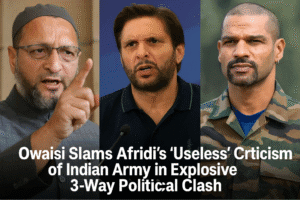Owaisi Slams Afridi’s “Useless” Criticism of Indian Army in Explosive 3-Way Political Clash
The recent Pahalgam terror attack in Kashmir, killing 26, has reignited tensions between India and Pakistan, spilling into a war of words between Pakistani cricket icon Shahid Afridi and Indian politician Asaduddin Owaisi. Afridi sparked outrage by labeling the Indian Army “useless” for failing to prevent the attack, while accusing India of reflexively blaming Pakistan. Owaisi dismissed Afridi as a “joker,” urging global accountability by reinstating Pakistan on the FATF terror-financing watchlist.
Former Indian cricketer Shikhar Dhawan countered Afridi by invoking India’s 1999 Kargil War victory, emphasizing national pride in the armed forces. The exchange underscores historical grievances, with India tightening non-military measures against Pakistan, including suspending the Indus Waters Treaty. As elections loom, security narratives dominate Indian politics, while Pakistan faces renewed scrutiny over militant groups. The clash highlights how public figures—athletes, politicians—amplify geopolitical rifts, blending nationalism with unresolved conflicts in a region where every word echoes decades of distrust.

Owaisi Slams Afridi’s “Useless” Criticism of Indian Army in Explosive 3-Way Political Clash
The recent Pahalgam terror attack in Jammu and Kashmir, which claimed 26 lives, has reignited tensions between India and Pakistan, spilling over into a heated exchange involving a Pakistani cricket legend, an Indian politician, and a former Indian cricketer. The incident underscores the fragile relationship between the two nations and the emotional weight of historical conflicts.
Afridi’s Provocative Remarks
Former Pakistani cricketer Shahid Afridi stirred controversy by criticizing the Indian Army’s response to the attack, calling it “useless” for failing to prevent the tragedy. In an interview with Samaa TV, Afridi accused India of habitually blaming Pakistan without evidence, stating, “Even if a cracker bursts in India, they blame Pakistan.” His comments, perceived as dismissive of India’s security challenges, drew immediate backlash.
Owaisi’s Sharp Rebuttal
Asaduddin Owaisi, AIMIM chief and Hyderabad MP, swiftly dismissed Afridi’s remarks, labeling him a “joker” and refusing to engage further. “Who is he? Do not mention such jokers in front of me,” Owaisi stated, redirecting focus to actionable measures. He urged reinstating Pakistan on the Financial Action Task Force (FATF) grey list, citing concerns over terrorism financing. Pakistan, removed from the list in 2022 after four years, faces renewed scrutiny as Owaisi emphasized global accountability: “Under international law, we can impose naval and air blockades… India has every right to self-defense.”
Dhawan’s Patriotic Defense
Former Indian opener Shikhar Dhawan countered Afridi on social media, invoking the 1999 Kargil War—a defining conflict where India repelled Pakistani infiltrators. Dhawan’s retort, “We beat you in Kargil… Focus on your own country,” resonated with national pride, reflecting public sentiment toward the armed forces. His response highlights how sports figures often become inadvertent participants in geopolitical discourse, especially amid heightened tensions.
Contextualizing the Conflict
The Pahalgam attack, the deadliest since the 2019 Pulwama strike (which killed 40 Indian security personnel), has intensified calls for stricter counterterrorism measures. India’s response—suspending the Indus Waters Treaty and tightening non-military restrictions—mirrors past escalations. The FATF grey list, a tool to combat terror financing, remains a diplomatic lever for India, which accuses Pakistan of harboring militant groups.
Celebrities in Geopolitical Crossfire
Afridi and Dhawan’s exchange underscores how athletes and public figures are often drawn into nationalist debates. Afridi, known for his philanthropic work in Afghanistan, has previously faced criticism for politicized statements, while Dhawan’s rebuttal reflects a broader trend of Indian celebrities defending national institutions amid external criticism.
Why This Matters
The war of words transcends mere rhetoric, revealing deeper fissures:
- Accountability in Terrorism: India’s insistence on Pakistan’s culpability versus Pakistan’s denial remains a stalemate.
- FATF as a Tool: Global mechanisms like FATF shape diplomatic strategies, impacting Pakistan’s economy and international standing.
- National Pride: Historical conflicts like Kargil remain emotional touchstones, influencing contemporary discourse.
Looking Ahead
As India approaches general elections, national security and cross-border tensions will dominate political narratives. For Pakistan, balancing FATF compliance with countering Indian allegations remains a tightrope walk. Meanwhile, the role of public figures in amplifying—or diffusing—tensions will continue to spark debate.
In a region where history looms large, every word carries weight. The Afridi-Owaisi-Dhawan clash is not just a war of words but a microcosm of enduring rivalries, where cricket, politics, and memory collide.
You must be logged in to post a comment.